Register via Eventbrite
Please note that there is currently a waitlist in operation.
Festival event guide is available via Eventee
Please note that download is limited to 100 attendees
Conway Institute 20th Festival Programme
Click above link to download a pdf of the Festival Programme
Show/hide content Open Close All
'Sharing Resources During Lean Times: How Hibernators and their Gut Symbionts Work Together During Winter Fasting'
Abundant fat stores and metabolic plasticity enable mammalian hibernators to cease feeding during seasons when food is scarce and low temperatures increase energy demands. However, prolonged fasting markedly alters the gut environment with implications for the hibernator hosts, their microbiotas, and the symbiotic relationship between the two. This presentation will use hibernation to explore tasks that still need doing when guts are “on holiday”, away from their typical day jobs processing and absorbing food. We’ll touch on the retention of key epithelial functions despite extensive mucosal atrophy, maintenance of the intestinal barrier, the remodeled intestinal immune system, how the food-free environment reshapes the microbiota and how some microbes collaborate with their hibernating hosts to recycle urea nitrogen, promoting tissue protein synthesis in the absence of dietary nitrogen intake.
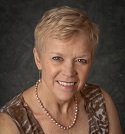 Biography: Hannah Carey is a Professor Emeritus at the University of Wisconsin-Madison School of Veterinary Medicine. Her PhD was conferred by the University of California, Davis based on research that explored feeding and nutritional ecology of marmots, a high alpine hibernating mammal. She followed up with postdoctoral work in intestinal transport physiology at the medical schools of the University of Nevada-Reno and Ohio State University. Her primary research program at UW-Madison has explored adaptations of the gastrointestinal tract and its microbiome to seasonal changes in physiology and nutrition in hibernating ground squirrels, and their potential applications to biomedicine. Dr. Carey is a Past President of the American Physiological Society and of the Federation of American Societies for Experimental Biology (FASEB).
Biography: Hannah Carey is a Professor Emeritus at the University of Wisconsin-Madison School of Veterinary Medicine. Her PhD was conferred by the University of California, Davis based on research that explored feeding and nutritional ecology of marmots, a high alpine hibernating mammal. She followed up with postdoctoral work in intestinal transport physiology at the medical schools of the University of Nevada-Reno and Ohio State University. Her primary research program at UW-Madison has explored adaptations of the gastrointestinal tract and its microbiome to seasonal changes in physiology and nutrition in hibernating ground squirrels, and their potential applications to biomedicine. Dr. Carey is a Past President of the American Physiological Society and of the Federation of American Societies for Experimental Biology (FASEB).
'The growing understanding of genomics and the rapid availability of data makes genomic sequencing a vital tool for disease surveillance'
The growing understanding of genomics and the rapid availability of data makes genomic sequencing a vital tool for disease surveillance. Timely and in-depth pathogen characterisation supports public health interventions, allowing for targeted and effective control of disease outbreaks. Genomic sequences can also help with the design and quality control of diagnostic assays, drugs, and vaccines by monitoring changes in the virus genome caused by evolutionary dynamics that may affect efficacy. In an outbreak setting, the rapid availability of sequencing data can help to inform epidemiological linkages between cases, identify causative agents of disease or infection, or even identify if an outbreak is over or just beginning. While sequencing can be challenging, improvements in technology over the past 10 years now mean it is possible to carry the lab with you into an outbreak, and start sequencing under sometimes extreme conditions. This talk will draw on experiences from the field to demonstrate how sequencing and diagnostics bridge the gap between basic research and public health interventions, while discussing the pitfalls and challenges of these new technologies as they are introduced into emergency or complex situations.
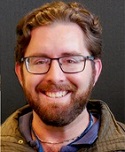 Biography: Dr Luke Meredith is a laboratory consultant working with the World Health Organization in the Eastern Mediterranean Regional Office (WHO/EMRO). The role entails developing, implementing and supporting regional genomic surveillance programmes for high-threat pathogens across the region. His PhD was awarded by Griffith University in Australia, focusing on HIV-1 virology, before spending time as a post-doctoral researcher in the University of Birmingham, working on basic virology of viral hepatitis. His focus switched from basic virology to public health and emergency responses in 2015, working as part of the West African Ebola Outbreak response in Sierra Leone. He then joined the University of Cambridge in 2015, taking a role as part of the ARTICnetwork, helping to bring sequencing to the heart of outbreak responses. He received a research fellowship as part of the inaugural Borysciewicz Biomedical Research Fellowship cohort at the University of Cambridge from 2017-2020, focusing on the development, implementation and commercialisation of portable diagnostics and sequencing platforms for mobile laboratories supporting outbreak responses. During this time, he worked in a variety of roles focused on public health and emergency responses across Africa, Asia and the Middle East, before serving as Laboratory Director for Amazon Diagnostics during the COVID-19 pandemic from 2020-22. He then returned to public health and emergency responses as part of the World Health Organization in 2022.
Biography: Dr Luke Meredith is a laboratory consultant working with the World Health Organization in the Eastern Mediterranean Regional Office (WHO/EMRO). The role entails developing, implementing and supporting regional genomic surveillance programmes for high-threat pathogens across the region. His PhD was awarded by Griffith University in Australia, focusing on HIV-1 virology, before spending time as a post-doctoral researcher in the University of Birmingham, working on basic virology of viral hepatitis. His focus switched from basic virology to public health and emergency responses in 2015, working as part of the West African Ebola Outbreak response in Sierra Leone. He then joined the University of Cambridge in 2015, taking a role as part of the ARTICnetwork, helping to bring sequencing to the heart of outbreak responses. He received a research fellowship as part of the inaugural Borysciewicz Biomedical Research Fellowship cohort at the University of Cambridge from 2017-2020, focusing on the development, implementation and commercialisation of portable diagnostics and sequencing platforms for mobile laboratories supporting outbreak responses. During this time, he worked in a variety of roles focused on public health and emergency responses across Africa, Asia and the Middle East, before serving as Laboratory Director for Amazon Diagnostics during the COVID-19 pandemic from 2020-22. He then returned to public health and emergency responses as part of the World Health Organization in 2022.
'Following the Science and Personal Passions for an Engaging and Rewarding Career in BioPharma'
Drug development is a long and arduous process; for every great discovery made in the lab, very few make it into phase 1 (first in human) clinical trials. Of those drug candidates that enter phase 1 clinical trials, 90% of them fail either during phase 1-3 clinical trials or do not show sufficient benefit/risk to obtain regulatory approval to market the drug. However, when these drugs do make it, the impact can be life altering, especially in diseases where there are no other options, or the existing treatments are not enough. After a medicine enters the market, knowledge about that medication does not end there. Instead, it’s just the start of an ongoing process, often lead by Medical Affairs, to continue to generate data and educate the clinical community on the safe and appropriate use of the medicines. Given the plethora of human diseases with significant unmet needs and the countless innovative treatments being developed, how do you decide where to focus and why? In this talk, I will give my perspective how I followed the science from leveraging asthma biologics to treat other allergic disorders, to leveraging innovative hemoglobin oxygen affinity modulators to correct the red blood cell sickling in Sickle Cell Disease. In addition, I’ll discuss how my personal passions of scientific story telling with complex data, and health equity and fairness have shaped my career pathway.
 Biography: Dr Noelle Griffin is the Head of Global Medical Affairs for Sickle Cell Disease at Pfizer. She joined Pfizer in 2022 following Pfizer’s acquisition of the San Francisco Bay Area Biotech, Global Blood Therapeutics (GBT). Prior to GBT, she spent several years at large Pharma companies including Genentech/Roche and Novartis. Noelle is a double graduate from UCD, having earned her BSc (1st Hons) Pharmacology. After a short stint at the RCSI, she returned to UCD and the Conway Institute to complete her PhD in Medicine under the supervision of Professor Des Fitzgerald. She moved to the US in 2006 to initially pursue her post-doc in San Diego but found her way into the pharmaceutical industry where she has spent the last 12+years in roles of increasing responsibility across multiple therapeutic areas. Her work in the pharma industry has focused on developing and executing medical strategies to ensure the safe and appropriate use of medicines.
Biography: Dr Noelle Griffin is the Head of Global Medical Affairs for Sickle Cell Disease at Pfizer. She joined Pfizer in 2022 following Pfizer’s acquisition of the San Francisco Bay Area Biotech, Global Blood Therapeutics (GBT). Prior to GBT, she spent several years at large Pharma companies including Genentech/Roche and Novartis. Noelle is a double graduate from UCD, having earned her BSc (1st Hons) Pharmacology. After a short stint at the RCSI, she returned to UCD and the Conway Institute to complete her PhD in Medicine under the supervision of Professor Des Fitzgerald. She moved to the US in 2006 to initially pursue her post-doc in San Diego but found her way into the pharmaceutical industry where she has spent the last 12+years in roles of increasing responsibility across multiple therapeutic areas. Her work in the pharma industry has focused on developing and executing medical strategies to ensure the safe and appropriate use of medicines.
Invited Lectures
Dr Liam Faller, Netherlands Cancer Institute
'Not just a gene machine: the ribosome as a regulator of antigen presentation'
Recent years have brought a renewed focus on the ribosome. It is now recognized that there is variability in the forms and function of the ribosome, and this can play a significant role in cellular phenotypes. In this seminar, I will describe how HLA Class I antigen processing and presentation (the process that enables CD8+ T cell immunosurveillance) is regulated by a population of specialized ribosomes. This population is stimulated by cytokines that upregulate APP components, and its loss reduces T cell recognition of tumor cells. Mechanistically, we show that these ribosomes exhibit enhanced translation of HLA Class I molecules and accessory APP components. Finally, analysis of patient data reveals that the this ribosomal population positively correlates with CD8+ T cell infiltration in many cancer types, a trend not seen for other ribosomal proteins. In all, we demonstrate that a specialized ribosome population enhances antigen presentation, something that may be exploited by cancer cells to escape immunosurveillance.
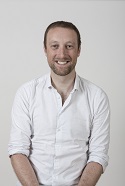 Biography: Liam studied for his BSc at NUIG, and graduated in 2003. He followed this with a PhD under the supervision of Prof. William Gallagher at the UCD Conway Institute in Dublin, where his project involved the study of DNA methylation in melanoma cells. He continued his focus on cancer in his Post Doctoral studies with Prof. Owen Sansom at the CRUK Beatson Institute in Glasgow. During this time he began to work on mTOR signalling, particularly focusing on mRNA translation. In 2017 he became a Group Leader at the NKI, where his lab focuses on “non-canonical” forms and functions of the ribosome.
Biography: Liam studied for his BSc at NUIG, and graduated in 2003. He followed this with a PhD under the supervision of Prof. William Gallagher at the UCD Conway Institute in Dublin, where his project involved the study of DNA methylation in melanoma cells. He continued his focus on cancer in his Post Doctoral studies with Prof. Owen Sansom at the CRUK Beatson Institute in Glasgow. During this time he began to work on mTOR signalling, particularly focusing on mRNA translation. In 2017 he became a Group Leader at the NKI, where his lab focuses on “non-canonical” forms and functions of the ribosome.
-----------------------------------------------------------
Dr Carsten Scholz, University Hospital Greifswald
'Cellular oxygen sensing – old ways and new routes'
Oxygen depletion (hypoxia) is a frequently encountered condition in both physiology and disease. Metazoans have evolved several cellular mechanisms to sense decreases in local oxygen availability and to mount adaptive responses to survive. The best characterised cellular oxygen sensing occurs via protein-4-hydroxylases 1-3 (PHD1-3) and factor inhibiting HIF (FIH). These four enzymes regulate α subunits of the dimeric transcription factor hypoxia-inducible factor (HIF) in an oxygen-dependent manner. Pharmacologic HIF hydroxylase inhibitors are an effective treatment of renal anaemia and may also be beneficial for the treatment of other hypoxia-associated diseases, such as chronic inflammation. Nonetheless, the question remains whether other mechanisms exist for the cellular adaptation to hypoxia, and, over the last years, additional cellular oxygen sensing mechanisms as well as oxygen sensors have been proposed. We recently suggested that FIH can form oxygen-dependent stable (likely covalent) protein oligomers (oxomers) with substrate proteins, representing a signalling mechanism for chronic changes in local oxygen supply. Thus, our knowledge about how cells sense and respond to hypoxia is still greatly expanding, increasing our understanding of oxygen (patho)physiology.
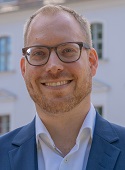 Biography: Carsten studied for his BSc at the University of Lubeck in Germany and graduated in 2006. During the summer of 2006, he spend two months in the group of Prof. Cormac Taylor at the UCD Conway Institute in Dublin as part of an internship. After this first brief experience at the UCD Conway Institute, Carsten studied for his MSc at the University of Lubeck in Germany and graduated in 2009. Immediately afterwards, he began a PhD under the supervision of Prof. Cormac Taylor at the UCD Conway Institute, where his project involved the study of the regulation of pro-inflammatory signalling by hypoxia and cellular oxygen sensors. He continued his Post Doctoral studies at UCD Systems Biology Ireland under the supervision of Prof. Cormac Taylor, focussing on the regulation of cellular energy metabolism by hypoxia and cellular oxygen sensors. In 2014, Carsten became a Junior Group Leader at the Institute of Physiology at the University of Zurich, Switzerland, where his lab focussed on “non-canonical” oxygen-dependent signalling and where he expanded his research focus towards the relevance and regulation of deubiquitinating enzymes. In 2022, he became the director of the Institute of Physiology at University Medicine Greifswald, Germany, where his own research group focusses on novel oxygen-dependent sensing and signalling mechanisms, pharmaceutical targeting of hypoxia-associated diseases as well as on the (patho)physiological relevance of deubiquitinating enzymes.
Biography: Carsten studied for his BSc at the University of Lubeck in Germany and graduated in 2006. During the summer of 2006, he spend two months in the group of Prof. Cormac Taylor at the UCD Conway Institute in Dublin as part of an internship. After this first brief experience at the UCD Conway Institute, Carsten studied for his MSc at the University of Lubeck in Germany and graduated in 2009. Immediately afterwards, he began a PhD under the supervision of Prof. Cormac Taylor at the UCD Conway Institute, where his project involved the study of the regulation of pro-inflammatory signalling by hypoxia and cellular oxygen sensors. He continued his Post Doctoral studies at UCD Systems Biology Ireland under the supervision of Prof. Cormac Taylor, focussing on the regulation of cellular energy metabolism by hypoxia and cellular oxygen sensors. In 2014, Carsten became a Junior Group Leader at the Institute of Physiology at the University of Zurich, Switzerland, where his lab focussed on “non-canonical” oxygen-dependent signalling and where he expanded his research focus towards the relevance and regulation of deubiquitinating enzymes. In 2022, he became the director of the Institute of Physiology at University Medicine Greifswald, Germany, where his own research group focusses on novel oxygen-dependent sensing and signalling mechanisms, pharmaceutical targeting of hypoxia-associated diseases as well as on the (patho)physiological relevance of deubiquitinating enzymes.
In Conversation: 'UCD Conway Institute: The Next 20 Years'
Dr Claire O'Connell, science journalist will be joined by a panel of guests who will share their memories of the Institute, their thoughts on the future of biomedical research and what the next 20 years might hold.
Panelists:
Prof. Philip Nolan, Director General, Science Foundation Ireland
Prof. Helen Roche, UCD VP Research, Innovation & Impact
Dr Noelle Griffin, Vice-President & Head of Global Medical Affairs, Pfizer
Dr Sarah McLoughlin, PPI Coordinator, Cancer Trials Ireland
Prof. Donal Brennan, UCD Professor of Gynaecological Oncology & Mater Misericordiae University Hospital Mr Michael O’Sullivan, Director of Operations, UCD Conway (2000-2021)
********************
Biographies
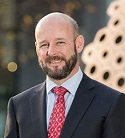 Prof. Philip Nolan, Director General, Science Foundation has degrees in Physiology (1988) and Medicine (1991) from UCD and a PhD in Physiology for his research on the control of breathing and the cardiovascular system during sleep. He was appointed Director of the UCD Conway Institute in 2003, before becoming Registrar and Deputy President at UCD (2004) and President of Maynooth University (2011). Philip became a familiar figure during the management of the COVID-19 pandemic as a member of the National Public Health Emergency Team, chairing its disease modelling subgroup. He took up the role Director-General of Science Foundation Ireland in January 2022 and appointed CEO Designate of the new Research and Innovation funding agency in May 2023. He is a Member of the Royal Irish Academy, and an Honorary Fellow of the Faculty of Public Health Medicine of the Royal College of Physicians of Ireland.
Prof. Philip Nolan, Director General, Science Foundation has degrees in Physiology (1988) and Medicine (1991) from UCD and a PhD in Physiology for his research on the control of breathing and the cardiovascular system during sleep. He was appointed Director of the UCD Conway Institute in 2003, before becoming Registrar and Deputy President at UCD (2004) and President of Maynooth University (2011). Philip became a familiar figure during the management of the COVID-19 pandemic as a member of the National Public Health Emergency Team, chairing its disease modelling subgroup. He took up the role Director-General of Science Foundation Ireland in January 2022 and appointed CEO Designate of the new Research and Innovation funding agency in May 2023. He is a Member of the Royal Irish Academy, and an Honorary Fellow of the Faculty of Public Health Medicine of the Royal College of Physicians of Ireland.
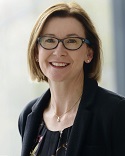 Prof. Helen Roche, UCD VP Research, Innovation & Impact was appointed to the role of interim UCD Vice-President for Research, Innovation and Impact in June 2023. Prior to this appointment, Helen was Director, UCD Conway Institute from April 2021. Helen's academic background is in human nutrition & molecular medicine. She established the first nutrigenomics research group in Ireland, at the Institute of Molecular Medicine at TCD. Her appointment as Full Professor of Nutrigenomics within UCD bridges disciplines based at the UCD Conway Institute and the UCD Institute of Food & Health. She has been awarded significant research funding from Science Foundation Ireland, Food for Health Ireland and the Department of Agriculture, Food and the Marine in collaboration with the HSE, SafeFood and several industry partners.
Prof. Helen Roche, UCD VP Research, Innovation & Impact was appointed to the role of interim UCD Vice-President for Research, Innovation and Impact in June 2023. Prior to this appointment, Helen was Director, UCD Conway Institute from April 2021. Helen's academic background is in human nutrition & molecular medicine. She established the first nutrigenomics research group in Ireland, at the Institute of Molecular Medicine at TCD. Her appointment as Full Professor of Nutrigenomics within UCD bridges disciplines based at the UCD Conway Institute and the UCD Institute of Food & Health. She has been awarded significant research funding from Science Foundation Ireland, Food for Health Ireland and the Department of Agriculture, Food and the Marine in collaboration with the HSE, SafeFood and several industry partners.
 Dr Noelle Griffin, Vice-President & Head of Global Medical Affairs for Sickle Cell Disease at Pfizer joined the company in 2022 following Pfizer’s acquisition of the San Francisco Bay Area Biotech, Global Blood Therapeutics (GBT). Prior to GBT, she spent several years at large pharmaceutical companies including Genentech/Roche and Novartis. Noelle is a double graduate from UCD, having earned her BSc (1st Hons) Pharmacology. After a short stint at the RCSI, she returned to UCD and the Conway Institute to complete her PhD in Medicine under the supervision of Prof. Des Fitzgerald. She moved to the US in 2006 to initially pursue postdoctoral research in San Diego but found her way into the pharmaceutical industry where she has spent the last 12+years in roles of increasing responsibility across multiple therapeutic areas. Her work in this industry sector has focused on developing and executing medical strategies to ensure the safe and appropriate use of medicines.
Dr Noelle Griffin, Vice-President & Head of Global Medical Affairs for Sickle Cell Disease at Pfizer joined the company in 2022 following Pfizer’s acquisition of the San Francisco Bay Area Biotech, Global Blood Therapeutics (GBT). Prior to GBT, she spent several years at large pharmaceutical companies including Genentech/Roche and Novartis. Noelle is a double graduate from UCD, having earned her BSc (1st Hons) Pharmacology. After a short stint at the RCSI, she returned to UCD and the Conway Institute to complete her PhD in Medicine under the supervision of Prof. Des Fitzgerald. She moved to the US in 2006 to initially pursue postdoctoral research in San Diego but found her way into the pharmaceutical industry where she has spent the last 12+years in roles of increasing responsibility across multiple therapeutic areas. Her work in this industry sector has focused on developing and executing medical strategies to ensure the safe and appropriate use of medicines.
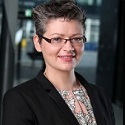 Dr Sarah McLoughlin, Public & Patient Involvement (PPI) Coordinator, Cancer Trials Ireland has been in role since October 2022. Sarah worked in academic biomedical research for more than 15 years in Ireland, Germany and the USA. She completed her PhD in UCD Conway Institute under the supervision of Prof. Breandan Kennedy in 2010. Sarah was diagnosed with cancer while researching circadian rhythms as a postdoctoral research associate at the University of Pennsylvania, USA. She moved back to Dublin part way through her treatment and became involved in patient advocacy. In 2018, she completed the IPPOSI patient education programme in health innovation, inspired by the European Patients Academy in Therapeutic Innovation. Sarah is a non- Executive Director with the Health Service Executive.
Dr Sarah McLoughlin, Public & Patient Involvement (PPI) Coordinator, Cancer Trials Ireland has been in role since October 2022. Sarah worked in academic biomedical research for more than 15 years in Ireland, Germany and the USA. She completed her PhD in UCD Conway Institute under the supervision of Prof. Breandan Kennedy in 2010. Sarah was diagnosed with cancer while researching circadian rhythms as a postdoctoral research associate at the University of Pennsylvania, USA. She moved back to Dublin part way through her treatment and became involved in patient advocacy. In 2018, she completed the IPPOSI patient education programme in health innovation, inspired by the European Patients Academy in Therapeutic Innovation. Sarah is a non- Executive Director with the Health Service Executive.
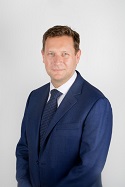 Prof. Donal Brennan, UCD Professor of Gynaecological Oncology & Mater Misericordiae University Hospital is a clinician scientist who graduated from the UCD School of Medicine and received a PhD in Cancer Biology from UCD. His research interests include ovarian cancer immunology, obesity related carcinogenesis and the development of evidence-based survivorship services for women living with and after cancer. He has helped develop and continues to work with a number of patient advocacy groups, firmly believing that patients should be involved in all stages of research and service development plans. Donal has received several awards for research, and was the inaugural recipient European Young Researcher of the Year in 2010. In 2016 he was appointed as UCD Professor of Gynaecological Oncology and Consultant Gynaecological Oncologist at the Mater Misericordiae University Hospital, Dublin. Donal and his team subsequently developed the UCD Gynaecological Oncology Group which was accredited as an ESGO Centre for Ovarian Cancer surgery in 2020 and ESGO training site in 2021 and is now the largest gynaecological cancer centre in Ireland. Donal is also a principal investigator in Systems Biology Ireland and leads multiple clinical and translational research projects. In 2023, he was appointed National Clinical Lead for Cancer Research in Ireland.
Prof. Donal Brennan, UCD Professor of Gynaecological Oncology & Mater Misericordiae University Hospital is a clinician scientist who graduated from the UCD School of Medicine and received a PhD in Cancer Biology from UCD. His research interests include ovarian cancer immunology, obesity related carcinogenesis and the development of evidence-based survivorship services for women living with and after cancer. He has helped develop and continues to work with a number of patient advocacy groups, firmly believing that patients should be involved in all stages of research and service development plans. Donal has received several awards for research, and was the inaugural recipient European Young Researcher of the Year in 2010. In 2016 he was appointed as UCD Professor of Gynaecological Oncology and Consultant Gynaecological Oncologist at the Mater Misericordiae University Hospital, Dublin. Donal and his team subsequently developed the UCD Gynaecological Oncology Group which was accredited as an ESGO Centre for Ovarian Cancer surgery in 2020 and ESGO training site in 2021 and is now the largest gynaecological cancer centre in Ireland. Donal is also a principal investigator in Systems Biology Ireland and leads multiple clinical and translational research projects. In 2023, he was appointed National Clinical Lead for Cancer Research in Ireland.
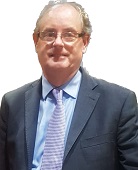 Mr Michael O’Sullivan, Director of Operations, UCD Conway (2000-2020) is a graduate of TU Dublin (formerly Dublin Institute of Technology), UCD and the Institute of Food Science and Technology (UK). His professional career in the higher education sector spanned 40 years of managing and operating university teaching and research buildings. His career began in St. Patrick’s College Maynooth in 1975 as a trainee technician. He progressed through the technical staff structure before beginning as Technical Manager in the UCD Conway Institute. He oversaw the development, staffing and equipping of the largest single investment in Irish bioscience education at that time. By 2020, Michael was Executive & Operations Director with responsibility for the efficient operation of three interconnected research centres serving a population of 600+ researchers and industry representatives across 15,000sq.m. of laboratories, core technologies and ancillary support space.
Mr Michael O’Sullivan, Director of Operations, UCD Conway (2000-2020) is a graduate of TU Dublin (formerly Dublin Institute of Technology), UCD and the Institute of Food Science and Technology (UK). His professional career in the higher education sector spanned 40 years of managing and operating university teaching and research buildings. His career began in St. Patrick’s College Maynooth in 1975 as a trainee technician. He progressed through the technical staff structure before beginning as Technical Manager in the UCD Conway Institute. He oversaw the development, staffing and equipping of the largest single investment in Irish bioscience education at that time. By 2020, Michael was Executive & Operations Director with responsibility for the efficient operation of three interconnected research centres serving a population of 600+ researchers and industry representatives across 15,000sq.m. of laboratories, core technologies and ancillary support space.
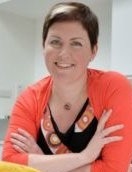 Dr Claire O'Connell is a freelance journalist who did a PhD in cell biology in UCD on gene regulation and morphology in mammary cells. After postdoctoral research in Glasgow on fruitfly 'kidneys' and in Sydney on Alzheimer plaques, Claire spent 5 years as a technical writer before making the leap into the world of journalism in 2005. Claire graduated with a Master’s in Science Communication from Dublin City University in 2008. She writes weekly columns for The Irish Times on science and health, as well as features and news on science, health and innovation for The Irish Times, Silicon Republic and other publications.
Dr Claire O'Connell is a freelance journalist who did a PhD in cell biology in UCD on gene regulation and morphology in mammary cells. After postdoctoral research in Glasgow on fruitfly 'kidneys' and in Sydney on Alzheimer plaques, Claire spent 5 years as a technical writer before making the leap into the world of journalism in 2005. Claire graduated with a Master’s in Science Communication from Dublin City University in 2008. She writes weekly columns for The Irish Times on science and health, as well as features and news on science, health and innovation for The Irish Times, Silicon Republic and other publications.
| Time | Venue | Session Details |
|---|---|---|
| 10am | Conway Lecture Theatre | WELCOME & OPENING ADDRESS |
| Professor Breandan Kennedy Professor Helen Roche, VPRII |
||
| 10.05am | Conway Lecture Theatre | PLENARY LECTURE 1 Chair: Prof. Cormac Taylor |
| Professor Hannah Carey University of Wisconsin-Madison |
'Sharing Resources During Lean Times: How Hibernators and their Gut Symbionts Work Together During Winter Fasting'. |
|
| 11am | Conway Foyer | Refreshments & Trade Exhibition |
| 11.30am | Conway Lecture Theatre | INVITED LECTURES Chair: Dr Maria Prencipe |
|
Dr Liam Faller Dr Carsten Scholz |
'Not just a gene machine: the ribosome as a regulator of antigen presentation'. 'Cellular oxygen sensing – old ways and new routes' |
|
| 12.30pm | Conway Foyer | Lunch & Trade Exhibition |
| 2.00pm | Charles Foyer /Kevin Barry Gallery/ Lounge | POSTER REVIEW SESSIONS |
| 2pm - 3pm | Session 1 (prime/odd numbers) | |
| 3pm - 4pm | Session 2 (even numbers) | |
| 4.00pm | Conway Lecture Theatre |
PLENARY LECTURE 2 |
| Dr Luke Meredith World Health Organisation |
'The growing understanding of genomics and the rapid availability of data makes genomic sequencing a vital tool for disease surveillance' |
|
| 5.00pm |
|
Close Day 1 |
| Time | Venue | Session Details | |
|---|---|---|---|
| 10.00am | O’Reilly Hall Main Stage |
PLENARY LECTURE 3 Chair: Dr Fiona McGillicuddy |
|
| Dr Noelle Griffin Vice President, Head Global Medical Affairs, Sickle Cell Disease, Pfizer |
'Following the Science and Personal Passions for an Engaging and Rewarding Career in BioPharma' | ||
| 11.00am | O’Reilly Hall Conservatory | Refreshments & Trade Exhibition | |
| 11.30am | O’Reilly Hall Main Stage |
FESTIVAL GOLD MEDAL COMPETITION |
|
|
Shortlisted Authors: Judges: |
|||
| 12.30pm | O’Reilly Hall Conservatory | Lunch & Trade Exhibition | |
| 2pm | O’Reilly Hall Main Stage |
'IN CONVERSATION' |
|
|
Dr Claire O'Connell, science journalist will be joined by: |
|||
| 3.15pm | O’Reilly Hall Foyer End |
Refreshments | |
| 3.30pm | O’Reilly Hall Foyer End |
CAREER ROUNDTABLES FOR EARLY CAREER RESEARCHERS Hints & tips for successful career journeys from Institute alumni |
|
| 5pm | O'Reilly Hall Main Stage |
AWARDS CEREMONY | |
| 5.30pm | O’Reilly Hall Conservatory |
20th ANNIVERSARY CELEBRATIONS |
The Festival committee have shortlisted 5 abstracts where the submitting author:
- is a named first author on a publication in the last 12 months
OR
- is a named first author on a manuscript submitted / under review
Shortlisted authors will give an 8 minute outline of this research including mention of any innovative potential to a judging panel on Friday, 20 October in O’Reilly Hall. The 2023 Conway Festival Medal sponsored by Cruinn Diagnostics will be awarded for the best presentation.
The shortlisted authors are:
Ciara Walsh (PI: Dr Dearbhaile Dooley)
An In Vitro and Ex Vivo Analysis of the Potential of GelMA Hydrogels as a Therapeutic Platform for Preclinical Spinal Cord Injury
Mykyta Malkov (PI: Prof. Cormac Taylor)
SUMOylation suppresses activity of the HIF-1α pathway in intestinal epithelial cells
Yinghao Li (PI: Prof. Wenxin Wang)
Gene therapy is a promising field for treating various diseases, but the lack of safe and efficient gene delivery vectors remains a major hurdle for large-scale clinical applications.
Sarah Kierans (PI: Prof Cormac Taylor)
Hypoxia induces a glycolytic complex in intestinal epithelial cells independent of HIF-1-driven glycolytic gene expression.
Haleema Azam (PI: Dr Maria Prencipe)
Castrate-resistant prostate cancer (CRPC) is challenging to treat, despite improvements with next-generation anti-androgens such as enzalutamide, due to acquired resistance.
Judging Panel:
Prof. Hannah Carey, University of Wisconsin-Madison
Prof. Breandan Kennedy, Director, UCD Conway Institute
Prof. Jeremy Simpson, Principal, College of Science
Prof. Catherine Godson, Associate Dean for Research, Innovation & Impact
Authors selected for poster exhibition on Thursday, 19 October in UCD Charles Institute [session 1 (2pm-3pm) or session 2 (3pm-4pm)] will give a 5 minute outline of research work including mention of any innovative potential to a 2-person panel composed of senior postdoctoral researchers and/or Conway Fellows who will select posters for commendation and prizes on the day.
- Please prepare an A0, portrait format poster outlining your research.
- There is no standard template for this conference.
- Guidance for poster design is available from UCD Research and UCD Teaching & Learning
- Printing is available on campus from UCD Copi-Print.
- Posters can be hung after 4pm on Wednesday, 18 or before 10am on Thursday, 19 October.
- Poster boards will be numbered. Your abstract reference number is also your poster board number.
- Velcro discs will be provided on the panels for each poster.
- Authors attend their poster for the full hour of your session.
- Panel feedback will be available afterwards: session 1 feedback (3.30-4pm, UCD Charles reception desk); session 2 feedback (5pm-5.30pm, UCD Conway reception).
Session 1: 2pm - 3pm, UCD Charles Institute
FRI23_001 Macleod, Hayley
FRI23_003 Wang, Zhiran
FRI23_005 Lu, Qi
FRI23_007 Wang, Xiaoyu
FRI23_009 Gordon, Noa
FRI23_011 Azeez, Aishat
FRI23_013 Leddy, Robert
FRI23_015 Millar, Braden
FRI23_017 Sainz Mejias, Maite
FRI23_019 Qiu, Bei
FRI23_021 Zhang, Jinxin
FRI23_023 Fehilly, John Denis
FRI23_025 Wirth, Janine
FRI23_027 Burke, Caoimbhe
FRI23_029 Lynn, Evelyn
FRI23_031 Jordan, Asia
FRI23_033 McCann, Tess
FRI23_035 O'Reilly, Eve
FRI23_037 Hillesheim, Elaine
FRI23_039 Villacampa, Marina
FRI23_041 Dunlop, Kristyn
FRI23_043 Wankar, Jitendra
FRI23_045 J. Hall, Thomas
FRI23_047 Murphy, Laura
FRI23_049 Ohlendieck, Cian
FRI23_051 Zitzmann, Kim
FRI23_053 Vartak, Tanwi
FRI23_055 Schäfer, Lea
FRI23_057 O'Callaghan, Marissa
FRI23_059 Connor, Adele
FRI23_061 Byrne, Rachel
FRI23_063 Parveen, Alia
FRI23_065 Kasianenko, Dmytro
FRI23_067 Dudzik, Aleksandra
FRI23_069 Zhao, Chunyu
FRI23_071 Hughes, Claire
FRI23_073 Davies, Molly
FRI23_075 Doyle, Emma
FRI23_077 Haverty, Ruth Anne
FRI23_079 Stepanova, Mariya
FRI23_081 Carey, Ciaran
FRI23_083 Jordan, Lynda
FRI23_085 Fouhy, Ella
FRI23_087 Ruddin, Grace
FRI23_089 Purves, Kevin
FRI23_091 Murphy, Clodagh
FRI23_093 Brady, Tara
FRI23_095 Conway, Ailbhe
FRI23_097 Dornan, Lucy
FRI23_099 Galvin, Danielle
FRI23_100 Bhattacharyya, Teerna
FRI23_101 Andrews, Darrell
FRI23_103 O'Sullivan, Alfie
FRI23_105 Jones, Luke
FRI23_107 Li, Mianyan
FRI23_109 Sheridan, Kevin
FRI23_111 Auer, Theresa
FRI23_113 Mac White, Delphi
FRI23_115 Drum, Kerrie
FRI23_117 Kundu, Karishma
FRI23_119 Castrosín, Irene
FRI23_121 Sarkar, Anwesha
FRI23_123 Corbett, Gillian
FRI23_125 Callanan, Sophie
FRI23_129 Keegan, Louise
FRI23_131 Ward, James
FRI23_135 McKeever, Kate
FRI23_137 Liu, Xueqin
FRI23_139 Mc Mahon, Ciara
FRI23_141 O'Callaghan, Marissa
Session 2: 3pm - 4pm, UCD Charles Institute
FRI23_002 Ban, Zhan
FRI23_004 Flood, Darragh
FRI23_006 Kebabci, Narod
FRI23_008 Pendino, Marzia
FRI23_010 Duggan, Niamh
FRI23_014 Jahangir Chowdhury, Arif
FRI23_016 Li, Yinghao
FRI23_018 Turner, Rory
FRI23_020 Pipelzadeh, Mahsa
FRI23_022 Malhotra, Sahil
FRI23_026 Jurado Martin, Irene
FRI23_028 Dooley, Cara
FRI23_030 Lynn, Evelyn
FRI23_032 Strachan, Elin
FRI23_034 Colucci, Patrizia
FRI23_036 Connolly, Claire
FRI23_038 Finlay, Rebecca
FRI23_040 Casalou, Cristina
FRI23_042 Roach, Felesha
FRI23_044 Sheridan, Rebecca
FRI23_046 Fallon, Leah
FRI23_048 Raphael, Bella
FRI23_050 Cosgrave, Joanne
FRI23_052 O’Donoghue, Lorna
FRI23_054 Kenny, Martin
FRI23_056 Walsh, Ciara
FRI23_058 Hession, Conor
FRI23_060 Aiyegbusi, Emmanuelle
FRI23_062 Walsh, Mark
FRI23_064 Parveen, Alia
FRI23_066 Lee, Rachel
FRI23_068 Zishan, Li
FRI23_070 Soon Fong, Kwong
FRI23_072 Brown, Hannah
FRI23_074 Evans, Christopher
FRI23_076 Jadeja, Shahnawaz
FRI23_078 Colbert, Ruth
FRI23_080 Gavin, Cian
FRI23_082 Neve, Ashish
FRI23_084 Bushmalyova, Albina
FRI23_086 Dennler, Olivier
FRI23_088 Rossoni, Andrea
FRI23_090 Sullivan, Mairead
FRI23_092 Turner, Rory
FRI23_094 O'Leary, Seán
FRI23_102 Biswas, Sharmila
FRI23_104 Drabinska, Joanna
FRI23_106 Cândido, Vanessa
FRI23_108 Dias, Tânia
FRI23_110 Brennan, Kieran
FRI23_112 Banerjee, Teerna
FRI23_114 Fox, Michelle
FRI23_116 Hanson, Theo
FRI23_118 O Grady, John Francis
FRI23_120 Doyle, Ciara
FRI23_122 Han, Jiangang
FRI23_124 Callanan, Sophie
FRI23_126 Callanan, Sophie
FRI23_130 Fitzgerald, Claire
FRI23_132 Aboud, Nourhan
FRI23_134 Daniel, Neil
FRI23_138 Gao, Ya
Platinum Sponsor

Gold Sponsors
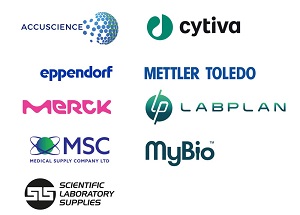

Social Media Links